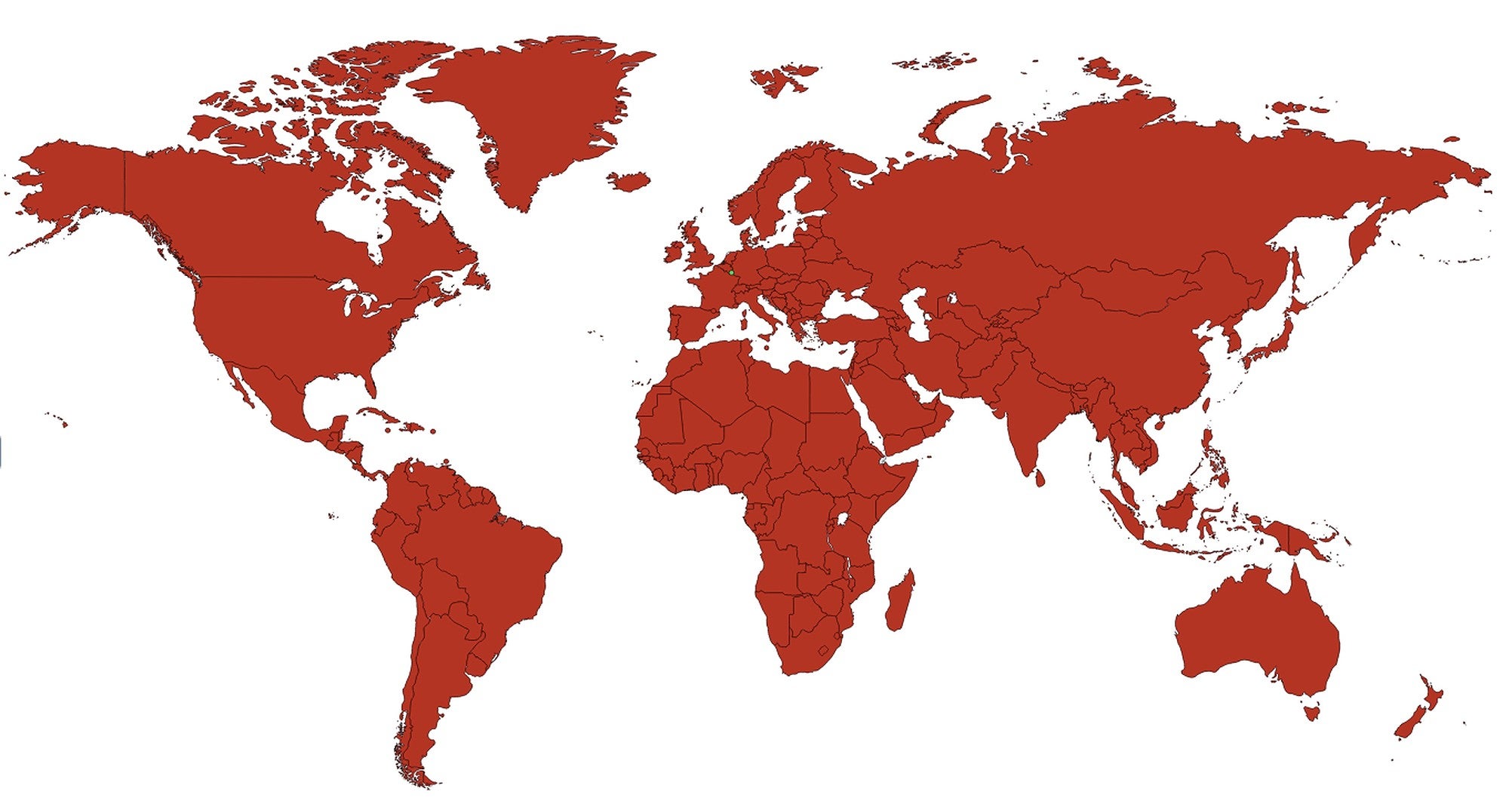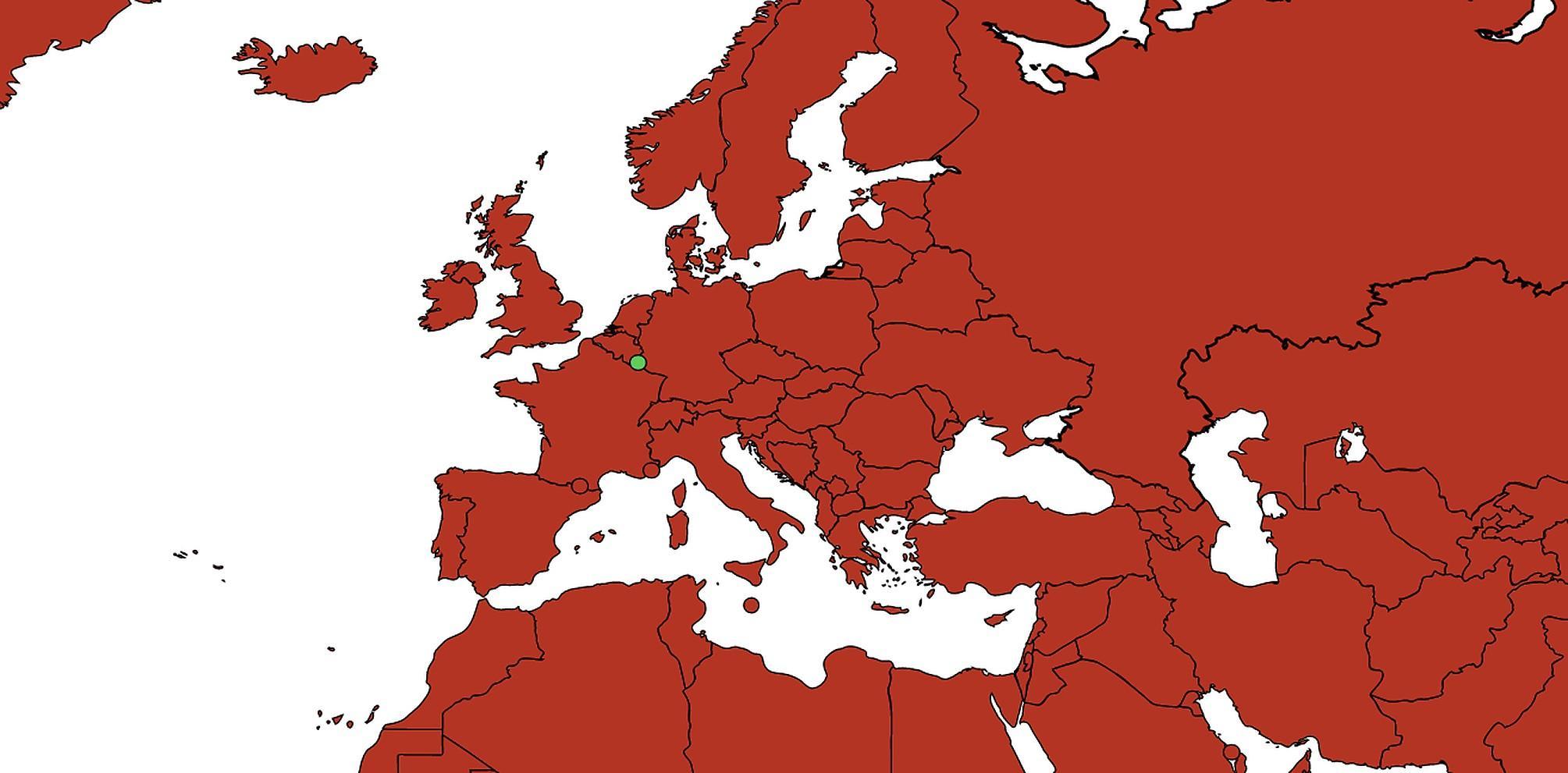Countries where public transport is completely free, mapped

Image: indy100 via mapchart.net
Public transport can be very expensive, depending where you live in the world.
But at midnight on 28 February, 2020, one country became the first in the world to make all public transport free for everyone.
Yup, you’ve guessed it (or, in fact, you probably didn’t) the answer is: Luxembourg. But why?
Luxembourg City, the capital of the small Grand Duchy, suffers from some of the worst traffic congestion in the world. It is home to about 110,000 people, but a further 400,000 commute into the city to work. A study suggested that drivers in the capital spent an average of 33 hours in traffic jams in 2016.
So to fix this problem, the government has just made all public transport completely free.
While the country as a whole has 600,000 inhabitants, nearly 200,000 people living in France, Belgium and Germany cross the border every day to work in Luxembourg, so it’s a win-win for everyone.
Several cities have tried similar schemes. Estonia's capital, Tallinn, introduced free public transport in 2013 but only for residents. The northern French city of Dunkirk (population: 200,000) also introduced free travel in 2018.
But the tiny nation of Luxembourg currently stands alone in Europe, and in fact the world, as the only country to offer free public transport nationwide.
Here’s a couple of maps to put that in context. See the small green circle next to France?


Other countries will likely be keeping an eye on Luxembourg’s bold new policy to see if it works. Because if one thing’s for sure, we could all do to use more public transport and rely less on cars.
Luxembourg becomes first country with free public transport
 AFP / JEAN-CHRISTOPHE VERHAEGENPrivate cars are the most used means of transport in Luxembourg, but the government is hoping to change that with the new free ride policy
AFP / JEAN-CHRISTOPHE VERHAEGENPrivate cars are the most used means of transport in Luxembourg, but the government is hoping to change that with the new free ride policy
Luxembourg on Saturday became the first country in the world to offer free public transport, as the small and wealthy EU country tries to help less-well-off workers and reduce road traffic.
Some cities elsewhere have already taken similar, partial measures. But the transport ministry said it was the first time such a decision covered an entire country.
The free transport, flagged as "an important social measure", affects approximately 40 percent of households and is estimated to save each one around 100 euros ($110) per year.
Not all passengers were aware of the change, which was brought forward one day ahead of schedule.
"It's free? I didn't know," said a woman in her 50s who gave her first name as Dominique as she waited at Luxembourg's main train station.
Transport workers were concerned about what impact the measure would have on their job security.
"We don't yet know" what will happen to their positions, said one ticket seller at the station who declined to give his name.
"All the public transport workers are worried. It's not yet clear."
- Traffic woes -
The measure is part of a plan intended to reduce congestion.
Private cars are the most used means of transport in the Grand Duchy, accounting for 47 percent of business travel and 71 percent of leisure transport.
With more than 200,000 people living in neighbouring France, Germany and Belgium who work in Luxembourg and most of them driving in, that makes for major traffic jams at peak hours.
The population of the tiny country is just 610,000 and those cross-border workers account for half the total employees.
The capital city of Luxembourg has invested in its public transport network, notably by building a tram network, but commuters complain it is still patchy.
It will be some years before the network links to the northern airport, for instance.
"There's been an enormous delay to the development of public transport," said Blanche Weber, head of the Luxembourg Ecological Movement pressing for better links on environmental grounds.
 AFP / JEAN-CHRISTOPHE VERHAEGENLuxembourg has invested in its public transport network, but commuters complain it is still patchy
AFP / JEAN-CHRISTOPHE VERHAEGENLuxembourg has invested in its public transport network, but commuters complain it is still patchy
"Systematic and continuous investment is a sine qua non (essential) condition for promoting the attractiveness of public transport," admitted transport minister Francois Bausch.
Sales of tickets on the domestic network -- which cost two euros per journey -- previously covered just eight percent of the 500-million-euro cost of running the transport system. That shortfall will now be met from the treasury.
Ticket machines are to be gradually removed from stations, but offices selling tickets for international train trips and for first-class seating in Luxembourg -- which continues to be a paying service -- will remain.
Luxembourg becomes first country to make public transport free
LUXEMBOURG (Reuters) - Luxembourg abolished fares for trains, trams and buses on Saturday in what the government said was a bid to tackle road congestion and pollution, as well as supporting low earners.
Passengers wait on a platform while a train arrives at Luxembourg railway station, as Luxembourg becomes the first country in the world to offer free public transport, February 29, 2020. REUTERS/Francois Lenoir
All standard-class journeys on public transport in the tiny and wealthy European country are now free of charge, compared to an annual pass worth 440 euros ($485) before. Travelers can still pay for first class, at a cost of 660 euros a year.
“For people with low incomes or the minimum wage, for them it’s really substantial,” transport minister Francois Bausch told Reuters.
“The main reason is to have a better quality of mobility, and then the side reason is clearly also environmental issues.”
Luxembourg has just over 600,000 inhabitants, but 214,000 more travel in for work every day from neighboring Germany, Belgium and France, causing heavy traffic jams as the majority of workers commute by car. More than half of Luxembourg’s greenhouse gas emissions come from transport.
Alexandre Turquia, a sales manager at a hotel group, drives to work in the capital Luxembourg City from a neighboring village. The trip should take 30 minutes, but traffic means it can last an hour. Still, he says his car is the best option.
“If it’s a day where I need to visit customers that are far away, I will take my car for sure,” he said.
But Mia Mayer, an employee at Amazon, has already switched from driving to work to taking the bus to save time and money.
“I had the experience on an almost daily basis of trying to get through the city center, getting really stuck in traffic and sometimes taking 45-50 minutes. Luxembourg City is not a huge place so that really is a long driving time,” she said.
To cope with the many commuters, Luxembourg plans to invest 3.9 billion euros in railways from 2018-28, upgrade the bus network and add more park-and-ride sites on the border.
Despite these investments, the government expects 65% of commuters to still get to work by car in 2025, down from 73% in 2017. Luxembourg is the first country to roll out free transport, but some cities, including Estonian capital Tallinn, have also experimented with the idea.
Editing by Gabriela Baczynska and Alexander Smith
Our Standards:The Thomson Reuters Trust Principles.
No comments:
Post a Comment